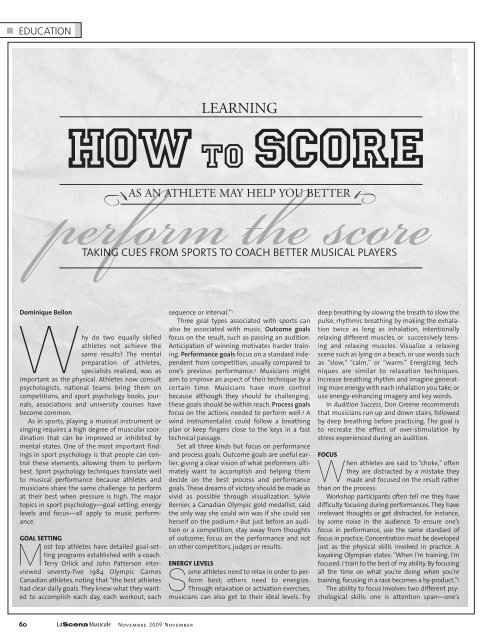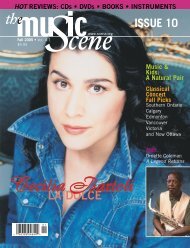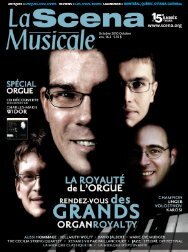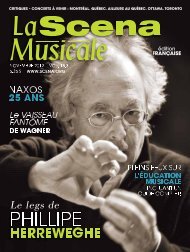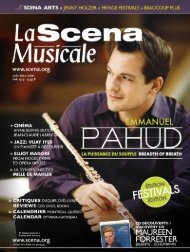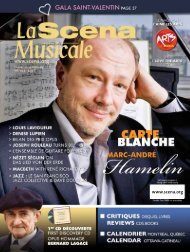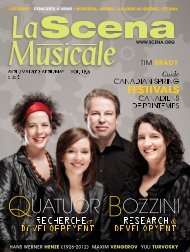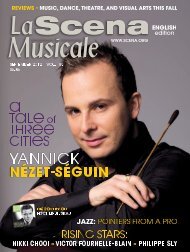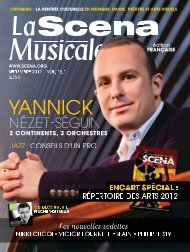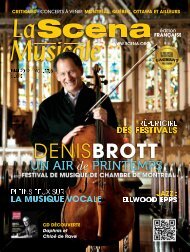Create successful ePaper yourself
Turn your PDF publications into a flip-book with our unique Google optimized e-Paper software.
EDUCATION<br />
how toscore<br />
LEARNING<br />
perform the score<br />
<br />
TAKING CUES FROM SPORTS TO COACH BETTER MUSICAL PLAYERS<br />
<br />
AS AN ATHLETE MAY HELP YOU BETTER<br />
Dominique Bellon<br />
Why do two equally skilled<br />
athletes not achieve the<br />
same results? The mental<br />
preparation of athletes,<br />
specialists realized, was as<br />
important as the physical. Athletes now consult<br />
psychologists, national teams bring them on<br />
competitions, and sport psychology books, journals,<br />
associations and university courses have<br />
become common.<br />
As in sports, playing a musical instrument or<br />
singing requires a high degree of muscular coordination<br />
that can be improved or inhibited by<br />
mental states. One of the most important findings<br />
in sport psychology is that people can control<br />
these elements, allowing them to perform<br />
best. Sport psychology techniques translate well<br />
to musical performance because athletes and<br />
musicians share the same challenge: to perform<br />
at their best when pressure is high. The major<br />
topics in sport psychology—goal setting, energy<br />
levels and focus—all apply to music performance.<br />
GOAL SETTING<br />
Most top athletes have detailed goal-setting<br />
programs established with a coach.<br />
Terry Orlick and John Patterson interviewed<br />
seventy-five 1984 Olympic Games<br />
Canadian athletes, noting that “the best athletes<br />
had clear daily goals. They knew what they wanted<br />
to accomplish each day, each workout, each<br />
sequence or interval.” 1<br />
Three goal types associated with sports can<br />
also be associated with music. Outcome goals<br />
focus on the result, such as passing an audition.<br />
Anticipation of winning motivates harder training.<br />
Performance goals focus on a standard independent<br />
from competition, usually compared to<br />
one’s previous performance. 2 Musicians might<br />
aim to improve an aspect of their technique by a<br />
certain time. Musicians have more control<br />
because although they should be challenging,<br />
these goals should be within reach. Process goals<br />
focus on the actions needed to perform well. 3 A<br />
wind instrumentalist could follow a breathing<br />
plan or keep fingers close to the keys in a fast<br />
technical passage.<br />
Set all three kinds but focus on performance<br />
and process goals. Outcome goals are useful earlier,<br />
giving a clear vision of what performers ultimately<br />
want to accomplish and helping them<br />
decide on the best process and performance<br />
goals. These dreams of victory should be made as<br />
vivid as possible through visualization. Sylvie<br />
Bernier, a Canadian Olympic gold medallist, said<br />
the only way she could win was if she could see<br />
herself on the podium. 4 But just before an audition<br />
or a competition, stay away from thoughts<br />
of outcome; focus on the performance and not<br />
on other competitors, judges or results.<br />
ENERGY LEVELS<br />
Some athletes need to relax in order to perform<br />
best; others need to energize.<br />
Through relaxation or activation exercises,<br />
musicians can also get to their ideal levels. Try<br />
deep breathing by slowing the breath to slow the<br />
pulse, rhythmic breathing by making the exhalation<br />
twice as long as inhalation, intentionally<br />
relaxing different muscles, or successively tensing<br />
and relaxing muscles. Visualize a relaxing<br />
scene such as lying on a beach, or use words such<br />
as “slow,” “calm,” or “warm.” Energizing techniques<br />
are similar to relaxation techniques.<br />
Increase breathing rhythm and imagine generating<br />
more energy with each inhalation you take, or<br />
use energy-enhancing imagery and key words.<br />
In Audition Success, Don Greene recommends<br />
that musicians run up and down stairs, followed<br />
by deep breathing before practicing. The goal is<br />
to recreate the effect of over-stimulation by<br />
stress experienced during an audition.<br />
FOCUS<br />
When athletes are said to “choke,” often<br />
they are distracted by a mistake they<br />
made and focused on the result rather<br />
than on the process.<br />
Workshop participants often tell me they have<br />
difficulty focusing during performances. They have<br />
irrelevant thoughts or get distracted, for instance,<br />
by some noise in the audience. To ensure one’s<br />
focus in performance, use the same standard of<br />
focus in practice. Concentration must be developed<br />
just as the physical skills involved in practice. A<br />
kayaking Olympian states: “When I’m training, I’m<br />
focused. I train to the best of my ability. By focusing<br />
all the time on what you’re doing when you’re<br />
training, focusing in a race becomes a by-product.” 5<br />
The ability to focus involves two different psychological<br />
skills: one is attention span—one’s<br />
60 Novembre 2009 November


